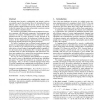Free Online Productivity Tools
i2Speak
i2Symbol
i2OCR
iTex2Img
iWeb2Print
iWeb2Shot
i2Type
iPdf2Split
iPdf2Merge
i2Bopomofo
i2Arabic
i2Style
i2Image
i2PDF
iLatex2Rtf
Sci2ools
220
click to vote
POPL
2008
ACM
2008
ACM
Cryptographically sound implementations for typed information-flow security
In language-based security, confidentiality and integrity policies conveniently specify the permitted flows of information between different parts of a program with diverse levels of trust. These policies enable a simple treatment of security, and they can often be verified by typing. However, their enforcement in concrete systems involves delicate compilation issues. We consider cryptographic enforcement mechanisms for imperative programs with untrusted components. Such programs may represent, for instance, distributed systems connected by some untrusted network. In source programs, security depends on an access-control policy for reading and writing the shared memory. In their implementations, shared memory is unprotected and security depends instead on encryption and signing. We build a translation from well-typed source programs and policies to cryptographic implementations. To establish its correctness, we develop a type system for the target language. Our typing rules enforce a ...
Delicate Compilation Issues | Keywords Secure Information | POPL 2008 | Programming Languages | Translation Preserves Typability |
Related Content
| Added | 03 Dec 2009 |
| Updated | 03 Dec 2009 |
| Type | Conference |
| Year | 2008 |
| Where | POPL |
| Authors | Cédric Fournet, Tamara Rezk |
Comments (0)

